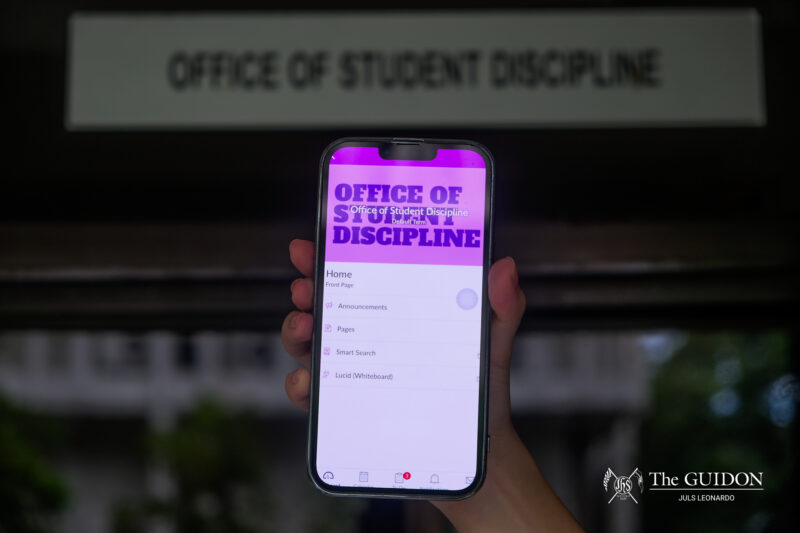FOLLOWING SCHOOL of Social Sciences (SOSS) Representative Christian Dy’s memorandum on the logistics concerns of non-accredited organizations, representatives from independent and unaccredited orgs attended the initial data-gathering meeting held on January 30, 2017. School of Humanities Representative Ferdy Acosta was also in attendance.
“We decided to hold this gathering so we could hear the side of independent organizations, find out what we can do, and also to present a few things that we’ve been doing already,” Dy said in an interview with the GUIDON.
He also stated the need to systematize and institutionalize sustainable solutions, as well as the need to consider the Council of Organizations of the Ateneo’s position.
This initiative was prompted by a concern raised by Thea Bonifacio (5 AB DipIR), after having difficulties reserving a venue for the flagship project of Hinomoto, the student arm of the Japanese studies program.
Dy laid out preliminary plans, which included the Resource Partnership Program between the organizations and SOSS Sanggu.
He also plans to set up a Sanggu office for independent organizations, which he said will be institutionalized in two weeks. “There is an existent structure already, LIONS (League of Independent Organizations), we’re just going to need to reactivate it…restructure the process, have to reimagine what it’s going to do. The skeleton is there, we just need to revive the existent structure,” he said.
He also mentioned the upcoming SOSS Week, where organizations will be given the chance to conduct activities, and the SOSS Planning Conference, which will be held on February 6 and is open to non-accredited orgs as well as individuals from SOSS.
Rem Casiño, Formator of the Sanggunian, also attended and spoke at the meeting, and introduced himself as the Coordinator for Emerging Organizations, coining a new term for non-accredited organizations.
He said that focus group discussions and further meetings will start next month, and beta-testing of the new rules will take place next school year. Dy calls emerging organizations to engage the Sanggu and the Office of Student Activities (OSA) by collating their concerns and volunteering for the Sanggu unit that will address the concerns of independent organizations.
Resource Partnership Program
Dy institutionalized the Resource Partnership Program, which aims to “provide organizations with opportunities to participate in SOSS’s policy agenda” by providing “financial, logistical, and administrative participation in joint projects with organizations.”
This program includes all organizations, but in the event that the SOSS Sanggu has to choose between organizations, “priority shall be given to organizations which are student arms of SOSS Departments.”
SOSS and organizations that will make use of the program may draft and sign a Memorandum of Agreement when necessary, and both will own the evaluation data of the projects. The monetary resources will come from the Sanggunian Budget on a semestral appropriation.
Possible Changes
One of the possible changes that Casiño and Dy brought up was a performance-based system, where organizations that perform better are given more resources.
Lyonel Tanganco, representative of Bagumbayani, compared this solution to a “poverty trap,” saying that organizations who are already having a hard time with organization management will be deprived of resources as well.
Dy suggested that a bare minimum system be employed instead, in which all organizations start with the same resources and only receive value-added perks later on.
Aside from this, Dy mentioned that independent organizations may either have representation in the Central Assembly, or have a special task force or committee instead.
Casiño also stated that the accreditation process might change. He added that there might be levels of organizations instead or there may be no dichotomy between accredited and non-accredited organizations.
Concerns
Aside from logistical concerns, representatives from non-accredited organizations brought up other issues, such as the difficulty they have in leadership formation, because of the lack of opportunities like the ASummit, which was only open to accredited organizations.
In terms of member involvement and sustainability, it was brought up that the administration should help organizations execute their projects well, so as to motivate their members to stay. Casiño suggested doing projects that have minimum activities but create maximum impact.
An issue that was also brought up was how the current Performance Management System makes it hard for accredited and unaccredited orgs to collaborate.
Another concern from non-accredited organizations was the current recruitment system. This school year, the recruitment week of non-accredited organizations occurred later in the semester as opposed to the recruitment week of accredited orgs, which occurred in the first month of school.
Annie Coronel, President of ISDA, said it is difficult for students to join and commit to non-accredited organizations when they already have their academics and existing organizations.
In response, Dy planned to create an online RecWeek manual in order for students to be aware of non-accredited organizations.
Other concerns included the lack of access to tarpaulins, posters, spaces for promotional material, the tendency of some organizations to shift their focus from their advocacy to human resources, finance sustainability, lack of spaces where emerging organizations can meet, and the lack of freedom to choose a moderator.
Sentiments
In an interview with the GUIDON, Cess Yu, President of Cuisina, said she feels “very hopeful” for this initiative and “very fortunate,” especially for someone whose organization is just starting.
Coronel said it “seems like a good start” for change in the systems involving non-accredited organizations, and hopes for more aid especially regarding technical aspects and “the nitty-gritty of org work” such as making a constitution and memorandums of agreement.
She said that they did not have anyone to represent them before, but with this initiative, it is clear that they are represented. “Now we do have a voice, and it’s kind of empowering and scary, but it’s kind of exciting, because at least we have a say,” Coronel said.
Richard Mercado, Externals Vice President of Blue Indie Komiks, hopes that the system may be more inclusive towards emerging organizations. “All the systems are there, they just don’t want to provide it to us,” he said.
But he also expressed apprehension towards the changes, because his organization is planning to get accredited, but finds out that the accreditation process may be scrapped next school year.
Yu hopes the Sanggunian will get the job done. “Taking care of 20 or so organizations is not a joke, hopefully kaya nila,” Yu said.
Editor’s note: Richard Mercado and Ferdy Acosta are members of the Graphic Design and Training and Development staffs of The GUIDON, respectively.







